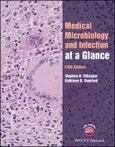Medical Microbiology and Infection at a Glance
The market-leading at a Glance series is popular among healthcare students and newly qualified practitioners for its concise, simple approach and excellent illustrations.
Each bite-sized chapter is covered in a double-page spread with clear, easy-to-follow diagrams, supported by succinct explanatory text.
Covering a wide range of topics, books in the at a Glance series are ideal as introductory texts for teaching, learning and revision, and are useful throughout university and beyond.
Everything you need to know about Microbiology and Infection... at a Glance!
In the newly revised and expanded fifth edition of Medical Microbiology and Infection at a Glance, distinguished authors Stephen H. Gillespie and Kathleen B. Bamford deliver a concise and popular introduction to medical microbiology that encapsulates foundational facts and principles in this rapidly growing and evolving subject area.
Fully revised and updated to include brand new research, the authors have added several new chapters on subjects including sepsis, infections disease eradication, the ‘normal’ flora in health and disease, non-tuberculous mycobacteria, antifungal therapy, bioterrorism, and high consequence infections. Readers will also benefit from the inclusion of:
- A thorough introduction to fundamental concepts in medical microbiology, including pathogen classification, innate and acquired immunity, and flora in health and disease
- Infection control, antibiotic resistance, and new and emerging infections and their control
- An exploration of bacteriology, including Staphylococcal, streptococcal infection, Gram-positive cocci and the alpha-haemolytic streptococci, TB, and leprosy
- A practical discussion of virology, including virus structure and classification, herpes viruses, DNA viruses, measles, mumps, rubella, and influenza
- A concise description of mycology and parasitology
- The impact of infection on all of the body systems
Medical Microbiology and Infection at a Glance is perfect for undergraduates studying medicine and medical science, as well as Foundation Programme doctors and interns looking for a rapid update in infection practice in microbiology. This concise but comprehensive book will also earn a place on the shelves of those training in allied health professions, notably nursing and laboratory science, and general microbiology students.
All content reviewed by students for students
Wiley Medical Education books are designed exactly for their intended audience. All of our books are developed in collaboration with students. This means that our books are always published with you, the student, in mind.
This book is also available as an e-book.
Table of Contents
Biographies vii
Preface to the Fifth Edition ix
About the Companion Website xi
Part 1 Concepts 1
1 Microbial pathogens, classification and concepts 2
2 Innate and acquired immunity 4
3 The ‘normal’ flora in health and disease 6
4 Pathogenicity and pathogenesis of infectious disease 8
5 Making a microbiological diagnosis of infection 10
6 Antimicrobial therapy - principals and concepts 12
7 Antibacterial agents - pharmacology and modes of action 14
8 Antimicrobial use and stewardship 16
9 Emergence and detection of resistance 18
10 Sources and transmission of infection 20
11 Principles of infection control 22
12 Infection in the healthcare environment 24
13 Immunization 26
14 Emerging infections 28
15 High consequence infectious diseases and bioterrorism preparedness 30
Part 2 Bacteriology 33
16 Staphylococcus 34
17 Haemolytic streptococcal infections 36
18 Other Gram- positive cocci and the alpha- haemolytic streptococci 38
19 Streptococcus pneumoniae 40
20 Listeria, bacillus, non‐diphtheria corynebacterium 42
21 Diphtheria, tetanus and pertussis 44
22 Mycobacterium tuberculosis 46
23 Non- tuberculous mycobacteria and leprosy 48
24 Clostridium 50
25 Non- sporing anaerobic infections 52
26 Neisseria and Moraxella 54
27 Small Gram- negative coccobacilli: Haemophilus, Brucella, Francisella, Yersinia and Bartonella 56
28 Pathogenicity of enteric Gram‐negative bacteria 58
29 Enterobacteriaceae clinical syndromes 60
30 Vibrio, Campylobacter and Helicobacter 62
31 Environmental pathogens: Pseudomonas, Burkholderia, Legionella and Acinetobacter 64
32 Chlamydia, Mycoplasma and Rickettsia 66
33 Spiral bacteria 68
Part 3 Virology 71
34 Virus structure and classification 72
35 Antiviral therapy 74
36 Herpesviruses I 76
37 Herpesviruses II 78
38 DNA viruses: adenovirus, parvovirus and poxvirus 80
39 Measles, mumps and rubella 82
40 Influenza viruses 84
41 Parainfluenza and other respiratory viruses 86
42 Enterovirus and viruses that infect the gastrointestinal tract 88
43 Hepatitis viruses 90
44 Tropical, exotic or arbovirus infections 92
Part 4 Mycology 95
45 Yeast infections 96
46 Filamentous fungi 98
47 Antifungal drugs and antifungal therapy 100
Part 5 Parasitology 103
48 Intestinal protozoa 104
49 Malaria, leishmaniasis and trypanosomiasis 106
50 Intestinal helminths 108
51 Tissue helminths 110
Part 6 Systemic infection 113
52 Congenital and perinatal infections 114
53 HIV infection and AIDS 116
54 Pyrexia of unknown origin and puerperal sepsis 118
55 Sepsis 120
56 Endocarditis, myocarditis and pericarditis 122
57 Infections of the central nervous system 124
58 Acute respiratory tract infections 126
59 Chronic infections of the lung and hospital acquired pneumonia 128
60 Urinary and genital infections 130
61 Infections of the bones and joints 132
62 Bacterial diarrhoeal disease 134
63 Zoonoses 136
64 Infections in immunocompromised patients 138
65 Ocular infections 140
66 Infections of the skin and soft tissue 142
Index 144








